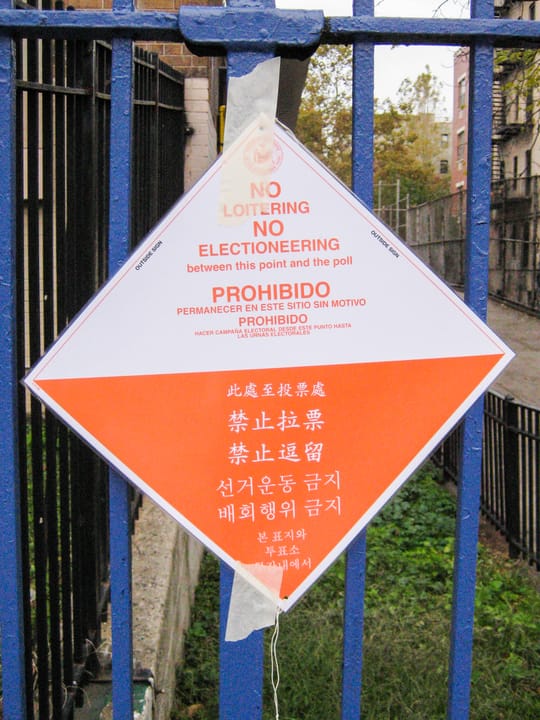Democracy 2K8
New York, NY, USA
I’d like to say that voting is an emotional experience; the truth is that it always makes me feel slightly and needlessly nervous, in the same way that standing in line at immigration does. I’m always convinced that I’m about to do Something Wrong and incur the wrath of officialdom: “Under the Statute of 1869 dealing with Polling Places, Political Canvassing and the Sale of Strong Spirits to Natives, Mr McIntyre, failing to close the curtains on the voting booth from left-to-right as mandated, using blue ink to sign your name in the voter list, and — above all — presenting yourself at a federally-constituted place of election wearing odd-colored socks makes you guilty of the offense of aggravated discombobulation and tort. Take him away, boys!”
If I — white, middle-class and over-educated — feel this way, it’s not hard to understand how voters with a less strongly-developed sense of entitlement can be cowed from voting by hostile officials and sneaking weasels from the opposite party, or why they might accept it without a murmur when someone tells them that their name isn’t on the list.
M., as it happens, found that her name wasn’t on the list, but it wouldn’t be true to say that she accepted it without a murmur. She takes her democracy very seriously — in any election, she’s the person who knows who she’s voting for on every line of the ballot, and why. She ended up filling out an ‘affidavit ballot’ and stalking off to give the Board of Elections a piece of her mind. I imagine that at this very moment a shaken official is being force-fed Xanax and patted on the back by his worried colleagues. “Let’s not ever screw up that woman’s voter registration again,”
he whispers through bloodless lips, hands trembling uncontrollably.
My own brush with democracy went far more smoothly. Notwithstanding reports of long lines in New York, I was in and out of the Ridge St polling station in minutes. There were no long lines, raised voices or angry mobs. The two auxiliary police assigned to the polling station sat in a corner, busy with their bagels and a copy of the New York Post, blithely ignoring the comings and goings of the voters. No one tried to cage me or bring up any old felonies (so embarrassing) and my name was on the list where it should be. Even the machine was a good old-fashioned upright device with funny-shaped little metal pegs and a big red steel lever, not some suspect Windows CE device with a propensity for rocking the vote in a pre-programmed direction. I cast my vote with a satisfying ‘thunk’ and I was done.
As we left, a polite African-American woman wanted to ask M. about her experience. “We’re seeing rather a lot of affidavit ballots at this station,”
she said, making notes on her clipboard.
I don’t think our precinct is at risk of any of the funny business that’s been a hallmark of some places in the last two elections, but it’s good to see that someone is still keeping a watchful eye. I find the people who are most involved in the process — the campaign volunteers, the poll watchers, the people at the polling stations checking the lists and calmly steering befuddled voters to the appropriate booth — very impressive. After all the sound and fury of the campaigns, the vicious mud-slinging and the angry counter-accusations, the million-dollar TV spots and the stage-managed ‘debates”, I always feel that they represent what democracy is really about.
